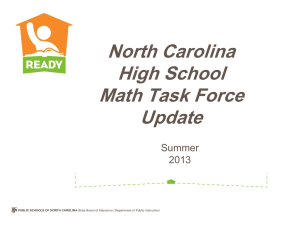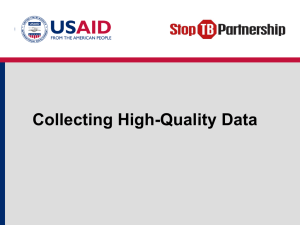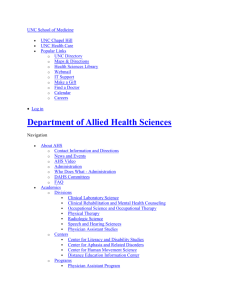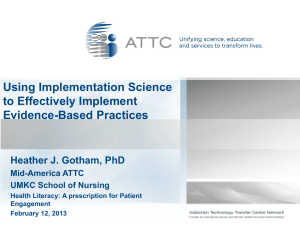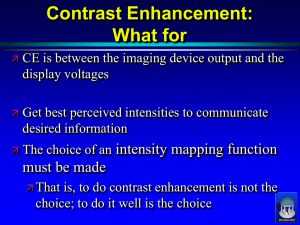Implementation Science - UNC Center for AIDS Research
advertisement
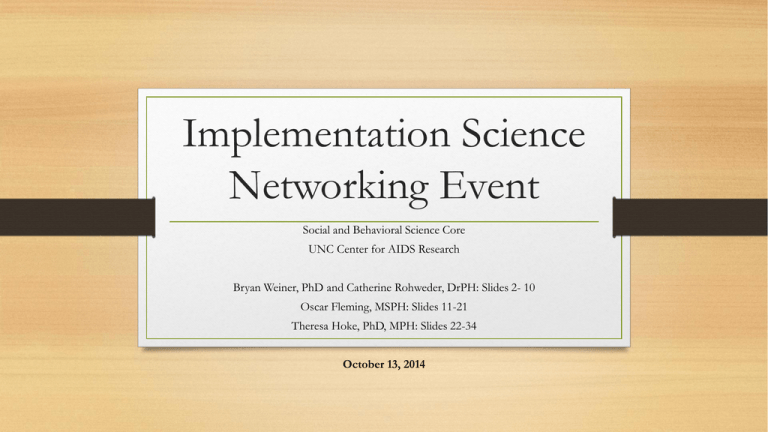
Implementation Science Networking Event Social and Behavioral Science Core UNC Center for AIDS Research Bryan Weiner, PhD and Catherine Rohweder, DrPH: Slides 2- 10 Oscar Fleming, MSPH: Slides 11-21 Theresa Hoke, PhD, MPH: Slides 22-34 October 13, 2014 Integrating Implementation Science into HIV Research: Resources at the UNC Gillings School of Global Public Health and the TraCS Institute Bryan Weiner, PhD and Catherine Rohweder, DrPH UNC Gillings School of Global Public Health Center for AIDS Research Fall Networking Event 10/13/14 Barriers to Evidence-Based Practice and Policy Adapted from: Glasgow and Emmons. How can we increase translation of research into practice? Types of evidence needed. Annu Rev Public Health. 2007; 28:413-33. Brownson, Chriqui, and Stamat3akis. Understanding Evidence-based Public Health Policy. Am J Pub Health. 2009; 99(9):1576-1583. 3 What is Implementation Science? IMPLEMENTATION SCIENCE is the study of methods to promote the use of research findings in healthcare, community, and policy contexts. As a multidisciplinary field, it examines how these findings are disseminated, implemented, and sustained by targeted audiences. Figure modified from National Cancer Institute Implementation Science Web Portal and Rubenstein et al. 2006. 4 The Consortium for Implementation Science The CIS facilitates collaborations among UNC and RTI scientists, practitioners and policy-makers with the goal of advancing dissemination and implementation science (D&I) through research, education and policy. The D&I Methods Unit, TraCS Institute The Methods Unit seeks to advance the science of translational research by supporting the development and integration of innovative analytic frameworks, methods, and metrics in community-engaged research. 5 Goals and Services The CIS / Methods Unit seek to: • Increase researcher knowledge of and skills in D&I Science • Facilitate the formation of investigator teams • Develop and test new measures for use in D&I studies CIS / Methods Unit faculty and staff provide consultations and services including: • Scientific support for grant/contract applications • Training and technical assistance for researchers, practitioners, and policy-makers • Seminars and/or lectures on Implementation Science 6 Examples of CIS / Methods Unit Work • Facilitated CDC IDIQ application lead by UNC Center for Health Promotion/Disease Prevention • Sponsored NC TraCS D&I Pilot Program • Delivered 50+ consultations to UNC and RTI investigators since July 2013 • Made 20 presentations to internal and external audiences including a seminar series on Implementation Science 101 • Taught a Health Policy and Management capstone course for UNC BSPH students • Contributed letters of support for grant and training applications 7 Dissemination and Implementation Portal www.tracs.unc.edu/diportal Purpose: Promote innovative D&I research Target audience: Investigators Approach: Integrate into the already existing TraCS and CIS websites Highlight expertise of D&I investigators at UNC Use TraCS media lab for webinars/podcasts Create new content not available elsewhere 8 Content Categories • Sample Grants and Grant Writing Resources • Methods Presentations • Sources of Evidence • Tools • Measures • Journals • Theories and Frameworks • Conferences and Training 9 9 Thank you! Please contact us at: • CIS@ConsortiumforIS.org or • nctracs@unc.edu 10 Improving Outcomes through Active Implementation Applied Implementation Science Presentation for the CFAR Core G Networking Event October 13, 2014 Oscar Fleming National Implementation Research Network FPG Child Development Institute University of North Carolina at Chapel Hill Defining Implementation Implementation is defined as a specified set of activities designed to put into practice an activity or program of known dimensions. Why Focus on Implementation? “Individuals cannot benefit from interventions they do not experience.” RESEARCH IMPLEMENTATION PRACTICE Context “Implementation science provides researchers [and practitioners, program developers and policymakers] with a framework to translate the evidence based program interventions into practices and policies that impact health outcomes.” Kroelinger et al. Maternal Child Health Journal 2014 Formula For Success • The “HOW” (e.g. strategies to build competencies) & the “WHO” (e.g. Teams) Effective Interventions Effective Implementation Methods • The “WHAT” (e.g. evidence-based home visitation programs) Enabling Contexts Socially Significant Outcomes Active Implementation Frameworks Usable Interventions Improvement Cycles Teams Stages Drivers Cascading Logic Model All children, youth, and families will live and thrive in healthy communities …Served by a quality [competent] workforce that helps assure their health and well-being… …facilitated by engaged and skilled organizational and State MCH/Title V leadership … …Supported with strategic workforce development and targeted technical support through MCH training programs… …Guided and resourced through supportive policy and federal guidance Implementation Infrastructure Outcomes: All children, youth, and families will live and thrive in healthy communities …Served by a quality [competent] workforce that helps assure their health and well-being… …facilitated by engaged and skilled organizational and State MCH/Title V leadership … …Supported with strategic workforce development and targeted technical support through MCH training programs… …Guided and resourced through supportive policy and federal guidance For More Information Oscar Fleming, MSPH • 919-962-7193 • oscar.fleming@unc.edu Frank Porter Graham Child Development Institute University of North Carolina Chapel Hill, NC http://nirn.fpg.unc.edu/ www.scalingup.org www.implementationconference.org Implementation Science Implementation Research: A Synthesis of the Literature Fixsen, D. L., Naoom, S. F., Blase, K. A., Friedman, R. M. & Wallace, F. (2005). Implementation Research: A Synthesis of the Literature. Tampa, FL: University of South Florida, Louis de la Parte Florida Mental Health Institute, The National Implementation Research Network (FMHI Publication #231). HTTP://NIRN.FPG.UNC.EDU ©Copyright Dean Fixsen and Karen Blase This content is licensed under Creative Commons license CC BY-NC-ND, Attribution-NonCommercial-NoDerivs. You are free to share, copy, distribute and transmit the work under the following conditions: Attribution — You must attribute the work in the manner specified by the author or licensor (but not in any way that suggests that they endorse you or your use of the work); Noncommercial — You may not use this work for commercial purposes; No Derivative Works — You may not alter or transform this work. Any of the above conditions can be waived if you get permission from the copyright holder. http://creativecommons.org/licenses/by-nc-nd/3.0 Theresa Hoke, PhD, MPH 23 FHI 360: A Comprehensive Approach to Human Development Civil Society + Peacebuilding Education Economic Development + Livelihoods Health Gender Nutrition Environment Research Communication + Social Marketing Technology Youth FHI 360: A Comprehensive Approach to Human Development Civil Society + Peacebuilding Education Economic Development + Livelihoods Health Gender Nutrition Environment Research Communication + Social Marketing Technology Youth Implementation Science in Global Health Maximizing Impact in an Imperfect World Thursday, September 4, 2014 8:30 a.m. – 4:30 p.m. Academy Hall, FHI 360 Washington, DC This event is sponsored by FHI 360’s Global Health, Population and Nutrition Group. What do we achieve through implementation science? • Identify implementation problems • Develop and test practical solutions • Determine how evidence-based interventions can achieve maximum impact in real-world settings • Facilitate full-scale implementation of evidence-based practices Examples of FHI 360’s work in implementation science Facility RCT to test scaled-up mobile phone intervention for HIV Care and Treatment Aims: 1) Evaluate mHealth intervention effects on patient adherence and health outcomes 2) Examine the delivery of the mHealth intervention for improving HIV care and treatment 3) Assess the costeffectiveness of the mHealth intervention Panos Pictures Testing implementation of evidencebased interventions for HIV risk reduction in Ukraine Tested EBIs • mPowerment - gay, bisexual and other MSM • Project Start - individuals to be released from a correctional facility • Street SMART – Most-atrisk adolescents • Psycho-Medical Intervention Model – People who inject drugs Jessica Scranton Examining integration of reproductive health services into HIV/AIDS services in South Africa, Uganda, and Kenya Service Delivery Health Workforce Medical Products Information Leadership and Governance Financing Testing integration of reproductive health services into HIV/AIDS services in South Africa, Uganda, and Kenya Service Delivery Improve client flow Health Workforce Motivate providers Medical Products Reinforce commodity management Information Leadership and Governance Financing Track performance Translate policy guidance into performance expectations Deliver services in a way that’s affordable to facilities and clients FHI 360’s way forward in implementation science Refine technical capacity Strengthen linkages with programs Form new alliances
